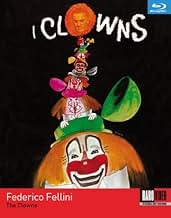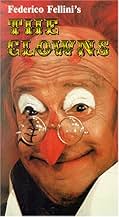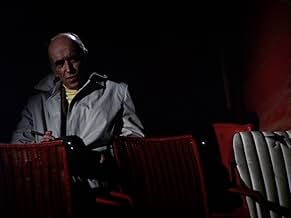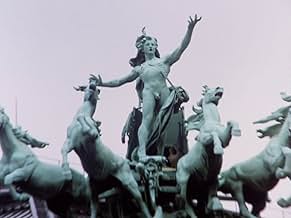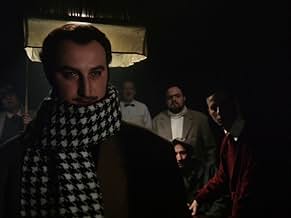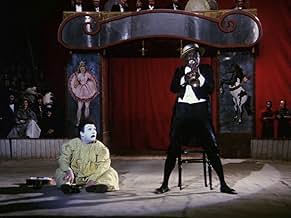NOTE IMDb
7,0/10
3,2 k
MA NOTE
Fellini explore une obsession de son enfance dans un mélange de souvenirs et de faux documentaire sur les clowns de cirque.Fellini explore une obsession de son enfance dans un mélange de souvenirs et de faux documentaire sur les clowns de cirque.Fellini explore une obsession de son enfance dans un mélange de souvenirs et de faux documentaire sur les clowns de cirque.
- Réalisation
- Scénario
- Casting principal
- Récompenses
- 4 victoires et 2 nominations au total
Riccardo Billi
- Clown
- (as Billi)
Gigi Reder
- Clown
- (as Reder)
Tino Scotti
- Clown
- (as Scotti)
Carlo Rizzo
- Clown
- (as Rizzo)
Alberto Colombaioni
- Clown
- (as I 4 Colombaioni)
Giacomo Furia
- Clown
- (as Furia)
Dante Maggio
- Clown
- (as Maggio)
Galliano Sbarra
- Clown
- (as Sbarra)
Peppino Janigro
- Clown
- (as Janigro)
Nino Terzo
- Clown
- (as Terzo)
Osiride Pevarello
- Clown
- (as Peverello)
Avis à la une
I had never seen this wonderful film before. I was aware that it had been made for TV, was about clowns, obviously and I had heard reports of terrible picture and sound. So, my blu-ray has been sitting around for some time until, prompted by a viewing of Fellini's first success, we decided to give this a go. It is fantastic. Clearly the quality issues have been dealt with and it would seem that the TV origins meant nothing. If the director was taking it easy after Satyricon, you could have fooled me. This has a magical and majestic extended opening sequence and an astonishing extended ending but in-between it is still all a swirl of exciting, amusing and emotional cinematic wonder. Ostensibly a documentary (we even see the director seemingly working with his crew) but there are illusions upon illusions and even the lovely interviews with elderly historic clowns from back in the day are so woven within the circus tapestry that reflects Fellini's past films, future films and his life itself, that we simply gasp and sigh as we share the maestro's own obvious delight.
As a great admirer of Federico Fellini, I was really taken with I Clowns. It is not one of Fellini's finest like La Dolce Vita, 8 1/2, Amarcord, Nights in Cabiria and La Strada, but has much to recommend it. I did feel at times that some of the dialogue collided into another bit of dialogue a little too much. And while certainly not amateurish at any rate I can think of other Fellini films better in this good, again not bad, actually it is skilled but with a somewhat grainy quality and lacking the dream-like feel of for instance 8 1/2. Faults aside, the costumes are stunning showing a lot of detail, while the settings are just as colourful. Nino Rota's scoring, which is largely made up of parts of his other works, is bright and cheerful, yet doesn't in any way undermine the melancholic ending. The structure of the story is much more focused than Satyricon, and while I did enjoy the documentary-like approach of some scenes, it was the personal and nostalgic charm that is part of Fellini's style all over that made I Clowns so intriguing. The clowns are interesting with more than them that meets the eye, they are not as easy to identify with as some of Fellini's other work but they are hardly detached either. The acting is engaging at feels at least naturalistic. All in all, largely successful and well done if not among Fellini's finest work. 8/10 Bethany Cox
10EdgarST
A sentimental journey shot in France and Italy, searching the trace of the great clowns of yesterday, by one of the few filmmakers that showed his love for these performers in his own films, an affection that dates from a childhood experience in his hometown Rimini, which is lovingly recreated in the dream-like opening scene. Made for Italian television, the film shows Fellini meeting a few survivors, talking to clowns' relatives and friends, visiting white clowns, and recreating the style of the old art, as the funeral of a famous clown, that closes the documentary. He even finds and films Anita Ekberg, the star of his 1960 masterpiece, "La dolce vita" (I always thought he saw her a bit as a joke); but what I find curious is that his film crew seems to be integrated by a clownish crowd without make-up. Nino Rota contributed one of his most cheerful scores.
This little film tends to stand quietly in the shadows of the great director's other works. It cannot compare to 8 1/2, or La Dolce Vita, but it carries a remarkable quality to it that isn't quite like his other films.
Fellini's circus theme is used here to a remarkable effect. There is a sadness that creeps in and around the film, like a cat watching a canary. It is unlike his other works, not as daring or bold, but worth some consideration.
Fellini's circus theme is used here to a remarkable effect. There is a sadness that creeps in and around the film, like a cat watching a canary. It is unlike his other works, not as daring or bold, but worth some consideration.
As far back as I can remember, I was always scared by clowns. Literally, my "coulrophobia" (that's the right word) happens to be my first life's episode I ever remember. So, allow me to start this review like Fellini did in his semi-documentary "I Clowns".
My first encounter with clowns was on TV (still a big screen from children's eyes) and being a sickly timid boy, I have always been unsettled by abnormality, let alone these creepy chalky faces with bright make-up. A few days later, during my 3rd birthday party, I saw one of my cousins being made-up as a clown and as fast as I could, I ran immediately to my aunt's knee and pretended to sleep, forcing my eyes to stay closed. Clowns became the incarnation of a devil I ignored all about.
And they were everywhere, I could hear their irritating voices on circus TV programs, watch them bullying poor "Dumbo", or hanging in these ugly paintings. The year after the birthday episode, my school's holiday party featured the two most famous clowns of my country. And I had to hide somewhere waiting for my Dad to take me, but the nightmare wasn't over yet: the same night, he bought me a 'memory' card game, and guess what? There were clowns there too, especially one picture that scared me so much I didn't even have the courage to throw it, I only left in a drawer. My cousin, who knew about my phobia, found it one day, and put it right before my eyes, laughing hysterically.
And I still remember the nightmares that picture gave me. Well, you got the point, clowns can truly affect a child, and coulrophobia is no joke. So, I could easily respond to the kid's traumatic experience in the opening sequence of Fellini"s "I Clowns". Their shadowy silhouettes as soon as the fanfare starts seemed to announce an ominous coming and as soon as they get in the spotlight for a four or five minutes of grotesque mayhem and ugliness, epitomizing everything I hated about them, I wanted the show to stop. Thanks, lord, I wasn't the only one, Fellini was scared by clowns, and hell, even Bart Simpson, the coolest boy ever, didn't want to sleep, fearing that the creepy clown-like bed would eat him.
My phobia slowly faded out, and I started to look at clowns more like pathetic characters, supposed to make us laugh of their ridicule aspect. And the point of Fellini's documentary is to try to understand the psychological roots of those half-repulsion half-fascination reactions clowns generally inspire. The study starts by exploring the probable causes of the child's fear: clowns reminded him of real eccentric people from the neighborhood: retarded, buffoons, creeps, freaks, genuinely hideous and irritating, but their personalities was even scarier because they were real while clowns are not.
Clowns are rooted in theater's history; their masks embody the least noble of human condition, allowing us to laugh at them, instead of fearing them. They have a cathartic power that probably inspired most of Fellini's approach to life. As I titled in my review of "Amarcord", we're all clowns in the big top of life. And Fellini's world can be regarded as a great circus, where the protagonists are all trapped in their own clowns' masks, while we watch their show. A clown can be a prankster, naive, well-mannered or mean-spirited, the purpose is to make us laugh, as if the ultimate aspect of life was absurdity and if life is all a joke, let's end with a fitting punch-line. That's the core of Fellini's philosophy.
And Fellini is the Ringleader of this Circus, driven by Nino Rota's turbulent fanfares. And only Fellini could have made such a jovial and poignant tribute, exploring in a semi-documentary format (he plays his own role) the historical steps that forged the clowns' archetypes. From Comedia del Arte's pantomimes, Pierrot's eternal figure, and some personal creations, two preeminent figures will emerge and constitute the pattern of most clowns' shows: the gentle and clumsy Auguste, and the elegant, sophisticated and serious white-faced clown, the obligatory straight man. Basically, all the clowns' icons: Medrano, Zavata, Bozo or those who scared the hell out of you as children, carried the essence of today's comedy.
There are a lot of insightful moments in "I Clowns", which works as an educational film. It doesn't provide a definite answer about clowns, but only a sad report on today's detachment. The last climactic sequence where veteran clowns (who've been interviewed before) pay tribute to a late colleague whose name sunk into oblivion is the perfect illustration of that loneliness innate to the clowns reflecting our own cruelty. I almost felt guilty for having hated them so much, and I like to picture them as misunderstood outcasts. A film about them was long overdue, and only Fellini could have made such a vivid, absorbing portrayal, almost working on a self-referential level.
Indeed, look at that head-shot on IMDb, it's probably the most eloquent illustration of Fellini's vision: he's half a clown, half a man. He incarnates this duality that prevails in clowns, both as the creators of their own caricatures, as artists, and victims of it, as men. And their conditions are driven by the audiences, and sometimes, meaner and more cruel than any clown in any number. The fate of "Gelsomina" in "La Strada" is the most tragic illustration of clown's conditions. And after the film, I guess I had more respect to clowns for their daringness to embody the unpleasant traits of human condition.
But from that courage blooms something absolutely endearing and irresistible, elevating the notion of clown to a state-of-mind. It's not just about make-ups and circuses, Fellini, just like Chaplin, was a clown, embodying the only real truth about life: it a serious thing that shouldn't be taken seriously.
And when you get that, you can get any Fellini's film.
My first encounter with clowns was on TV (still a big screen from children's eyes) and being a sickly timid boy, I have always been unsettled by abnormality, let alone these creepy chalky faces with bright make-up. A few days later, during my 3rd birthday party, I saw one of my cousins being made-up as a clown and as fast as I could, I ran immediately to my aunt's knee and pretended to sleep, forcing my eyes to stay closed. Clowns became the incarnation of a devil I ignored all about.
And they were everywhere, I could hear their irritating voices on circus TV programs, watch them bullying poor "Dumbo", or hanging in these ugly paintings. The year after the birthday episode, my school's holiday party featured the two most famous clowns of my country. And I had to hide somewhere waiting for my Dad to take me, but the nightmare wasn't over yet: the same night, he bought me a 'memory' card game, and guess what? There were clowns there too, especially one picture that scared me so much I didn't even have the courage to throw it, I only left in a drawer. My cousin, who knew about my phobia, found it one day, and put it right before my eyes, laughing hysterically.
And I still remember the nightmares that picture gave me. Well, you got the point, clowns can truly affect a child, and coulrophobia is no joke. So, I could easily respond to the kid's traumatic experience in the opening sequence of Fellini"s "I Clowns". Their shadowy silhouettes as soon as the fanfare starts seemed to announce an ominous coming and as soon as they get in the spotlight for a four or five minutes of grotesque mayhem and ugliness, epitomizing everything I hated about them, I wanted the show to stop. Thanks, lord, I wasn't the only one, Fellini was scared by clowns, and hell, even Bart Simpson, the coolest boy ever, didn't want to sleep, fearing that the creepy clown-like bed would eat him.
My phobia slowly faded out, and I started to look at clowns more like pathetic characters, supposed to make us laugh of their ridicule aspect. And the point of Fellini's documentary is to try to understand the psychological roots of those half-repulsion half-fascination reactions clowns generally inspire. The study starts by exploring the probable causes of the child's fear: clowns reminded him of real eccentric people from the neighborhood: retarded, buffoons, creeps, freaks, genuinely hideous and irritating, but their personalities was even scarier because they were real while clowns are not.
Clowns are rooted in theater's history; their masks embody the least noble of human condition, allowing us to laugh at them, instead of fearing them. They have a cathartic power that probably inspired most of Fellini's approach to life. As I titled in my review of "Amarcord", we're all clowns in the big top of life. And Fellini's world can be regarded as a great circus, where the protagonists are all trapped in their own clowns' masks, while we watch their show. A clown can be a prankster, naive, well-mannered or mean-spirited, the purpose is to make us laugh, as if the ultimate aspect of life was absurdity and if life is all a joke, let's end with a fitting punch-line. That's the core of Fellini's philosophy.
And Fellini is the Ringleader of this Circus, driven by Nino Rota's turbulent fanfares. And only Fellini could have made such a jovial and poignant tribute, exploring in a semi-documentary format (he plays his own role) the historical steps that forged the clowns' archetypes. From Comedia del Arte's pantomimes, Pierrot's eternal figure, and some personal creations, two preeminent figures will emerge and constitute the pattern of most clowns' shows: the gentle and clumsy Auguste, and the elegant, sophisticated and serious white-faced clown, the obligatory straight man. Basically, all the clowns' icons: Medrano, Zavata, Bozo or those who scared the hell out of you as children, carried the essence of today's comedy.
There are a lot of insightful moments in "I Clowns", which works as an educational film. It doesn't provide a definite answer about clowns, but only a sad report on today's detachment. The last climactic sequence where veteran clowns (who've been interviewed before) pay tribute to a late colleague whose name sunk into oblivion is the perfect illustration of that loneliness innate to the clowns reflecting our own cruelty. I almost felt guilty for having hated them so much, and I like to picture them as misunderstood outcasts. A film about them was long overdue, and only Fellini could have made such a vivid, absorbing portrayal, almost working on a self-referential level.
Indeed, look at that head-shot on IMDb, it's probably the most eloquent illustration of Fellini's vision: he's half a clown, half a man. He incarnates this duality that prevails in clowns, both as the creators of their own caricatures, as artists, and victims of it, as men. And their conditions are driven by the audiences, and sometimes, meaner and more cruel than any clown in any number. The fate of "Gelsomina" in "La Strada" is the most tragic illustration of clown's conditions. And after the film, I guess I had more respect to clowns for their daringness to embody the unpleasant traits of human condition.
But from that courage blooms something absolutely endearing and irresistible, elevating the notion of clown to a state-of-mind. It's not just about make-ups and circuses, Fellini, just like Chaplin, was a clown, embodying the only real truth about life: it a serious thing that shouldn't be taken seriously.
And when you get that, you can get any Fellini's film.
Le saviez-vous
- AnecdotesThis film has a 100% rating based on 19 critic reviews on Rotten Tomatoes.
- ConnexionsEdited into Circo Fellini (2011)
Meilleurs choix
Connectez-vous pour évaluer et suivre la liste de favoris afin de recevoir des recommandations personnalisées
Détails
Box-office
- Montant brut mondial
- 284 $US
- Durée
- 1h 32min(92 min)
- Mixage
- Rapport de forme
- 1.33 : 1
Contribuer à cette page
Suggérer une modification ou ajouter du contenu manquant

